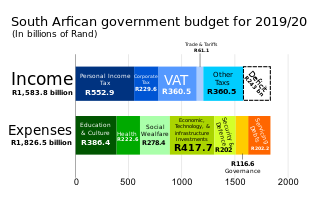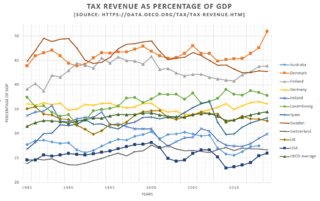Related Research Articles
A capital gains tax (CGT) is the tax on profits realized on the sale of a non-inventory asset. The most common capital gains are realized from the sale of stocks, bonds, precious metals, real estate, and property.

Taxation in the United Kingdom may involve payments to at least three different levels of government: central government, devolved governments and local government. Central government revenues come primarily from income tax, National Insurance contributions, value added tax, corporation tax and fuel duty. Local government revenues come primarily from grants from central government funds, business rates in England, Council Tax and increasingly from fees and charges such as those for on-street parking. In the fiscal year 2014–15, total government revenue was forecast to be £648 billion, or 37.7 per cent of GDP, with net taxes and National Insurance contributions standing at £606 billion.
A corporate tax, also called corporation tax or company tax, is a type of direct tax levied on the income or capital of corporations and other similar legal entities. The tax is usually imposed at the national level, but it may also be imposed at state or local levels in some countries. Corporate taxes may be referred to as income tax or capital tax, depending on the nature of the tax.
Double taxation is the levying of tax by two or more jurisdictions on the same income, asset, or financial transaction.
Taxation in Indonesia includes income tax, value added tax and carbon tax.
Income tax in Australia is imposed by the federal government on the taxable income of individuals and corporations. State governments have not imposed income taxes since World War II. On individuals, income tax is levied at progressive rates, and at one of two rates for corporations. The income of partnerships and trusts is not taxed directly, but is taxed on its distribution to the partners or beneficiaries. Income tax is the most important source of revenue for government within the Australian taxation system. Income tax is collected on behalf of the federal government by the Australian Taxation Office.
Income taxes in Canada constitute the majority of the annual revenues of the Government of Canada, and of the governments of the Provinces of Canada. In the fiscal year ending 31 March 2018, the federal government collected just over three times more revenue from personal income taxes than it did from corporate income taxes.
Taxation represents the biggest source of revenues for the Peruvian government. For 2016, the projected amount of taxation revenues was S/.94.6 billion. There are four taxes that make up approximately 90 percent of the taxation revenues:

Corporate tax is imposed in the United States at the federal, most state, and some local levels on the income of entities treated for tax purposes as corporations. Since January 1, 2018, the nominal federal corporate tax rate in the United States of America is a flat 21% following the passage of the Tax Cuts and Jobs Act of 2017. State and local taxes and rules vary by jurisdiction, though many are based on federal concepts and definitions. Taxable income may differ from book income both as to timing of income and tax deductions and as to what is taxable. The corporate Alternative Minimum Tax was also eliminated by the 2017 reform, but some states have alternative taxes. Like individuals, corporations must file tax returns every year. They must make quarterly estimated tax payments. Groups of corporations controlled by the same owners may file a consolidated return.
Taxes provide the most important revenue source for the Government of the People's Republic of China. Tax is a key component of macro-economic policy, and greatly affects China's economic and social development. With the changes made since the 1994 tax reform, China has sought to set up a streamlined tax system geared to a socialist market economy.
Taxation in Israel include income tax, capital gains tax, value-added tax and land appreciation tax. The primary law on income taxes in Israel is codified in the Income Tax Ordinance. There are also special tax incentives for new immigrants to encourage aliyah.
An expatriation tax or emigration tax is a tax on persons who cease to be tax-resident in a country. This often takes the form of a capital gains tax against unrealised gain attributable to the period in which the taxpayer was a tax resident of the country in question. In most cases, expatriation tax is assessed upon change of domicile or habitual residence; in the United States, which is one of only three countries to substantively tax its overseas citizens, the tax is applied upon relinquishment of American citizenship, on top of all taxes previously paid. Australia has "Deemed disposal tax" which in essence is exit tax.
Taxation in Finland is mainly carried out through the Finnish Tax Administration, an agency of the Ministry of Finance. Finnish Customs and the Finnish Transport and Communications Agency Traficom, also collect taxes. Taxes collected are distributed to the Government, municipalities, church, and the Social Insurance Institution, Kela.
Taxes in Germany are levied by the federal government, the states (Länder) as well as the municipalities (Städte/Gemeinden). Many direct and indirect taxes exist in Germany; income tax and VAT are the most significant.

Taxation may involve payments to a minimum of two different levels of government: central government through SARS or to local government. Prior to 2001 the South African tax system was "source-based", where in income is taxed in the country where it originates. Since January 2001, the tax system was changed to "residence-based" wherein taxpayers residing in South Africa are taxed on their income irrespective of its source. Non residents are only subject to domestic taxes.

Taxes in Spain are levied by national (central), regional and local governments. Tax revenue in Spain stood at 36.3% of GDP in 2013. A wide range of taxes are levied on different sources, the most important ones being income tax, social security contributions, corporate tax, value added tax; some of them are applied at national level and others at national and regional levels. Most national and regional taxes are collected by the Agencia Estatal de Administración Tributaria which is the bureau responsible for collecting taxes at the national level. Other minor taxes like property transfer tax (regional), real estate property tax (local), road tax (local) are collected directly by regional or local administrations. Four historical territories or foral provinces collect all national and regional taxes themselves and subsequently transfer the portion due to the central Government after two negotiations called Concierto and the Convenio. The tax year in Spain follows the calendar year. The tax collection method depends on the tax; some of them are collected by self-assessment, but others follow a system of pay-as-you-earn tax with monthly withholdings that follow a self-assessment at the end of the term.
Taxation in Gibraltar is determined by the law of Gibraltar which is based on English law, but is separate from the UK legal system. Companies and non residents do not pay income tax unless the source of this income is or is deemed to be Gibraltar. Individuals pay tax on a worldwide basis on income from employment or self employment if they are ordinarily resident in Gibraltar. There is no tax on capital income.
Taxes in Bulgaria are collected on both state and local levels. The most important taxes are collected on state level, these taxes include income tax, social security, corporate taxes and value added tax. On the local level, property taxes as well as various fees are collected. All income earned in Bulgaria is taxed on a flat rate of 10%. Employment income earned in Bulgaria is also subject to various social security insurance contributions. In total the employee pays 12.9% and the employer contributes what corresponds to 17.9%. Corporate income tax is also a flat 10%. Value-Added Tax applies at a flat rate of 20% on virtually all goods and services. A lower rate of 9% applies on only hotel services.
Taxation in Malta is levied by the State and it is administered by the Commissioner for Revenue. The total tax revenues in 2014 amounted to €2.747 Billion, which represents 34.6% of the Maltese GDP. The main sources of tax revenue were value-added tax, income tax, and social security contributions.

Tax revenue in Luxembourg was 38.65% of GDP in 2017, which is just above the average OECD in 2017.
References
- ↑ "Complete information on individual income tax: Types, filing details and other". IRAS on individual income tax. Retrieved 26 February 2015.
- ↑ "Income tax details for foreigners and expatriates". IRAS on individual income tax. Retrieved 26 February 2015.
- ↑ "Year of Assessment and Basis Period". SingaporeAccounting.com. Retrieved 12 Nov 2016.
- ↑ "Basic Guide to Corporate Income Tax for Companies". Default. Retrieved 2023-04-26.
- ↑ "Overview of Singapore Taxation". 3ecpa.com.sg. Retrieved 27 Jun 2017.